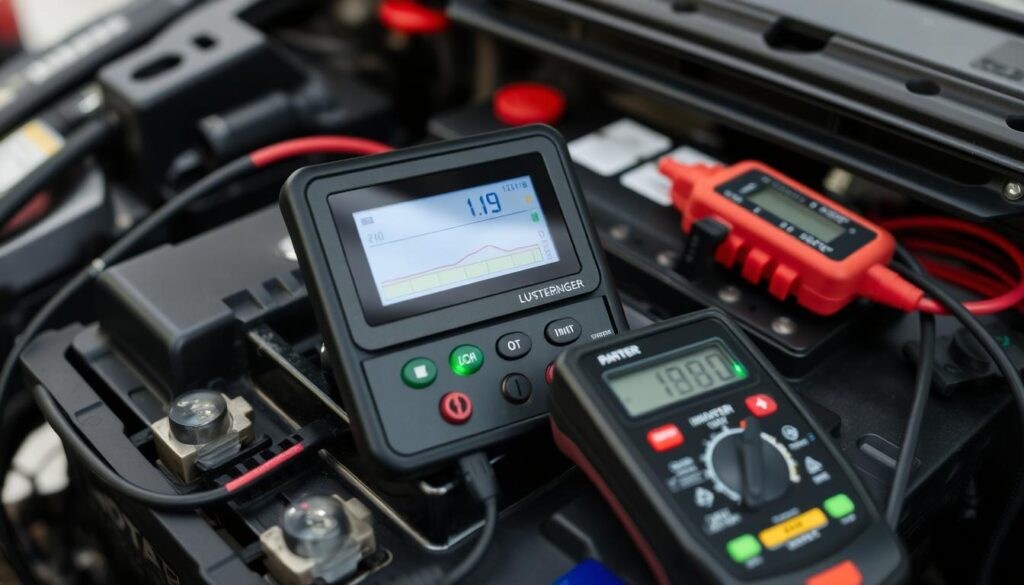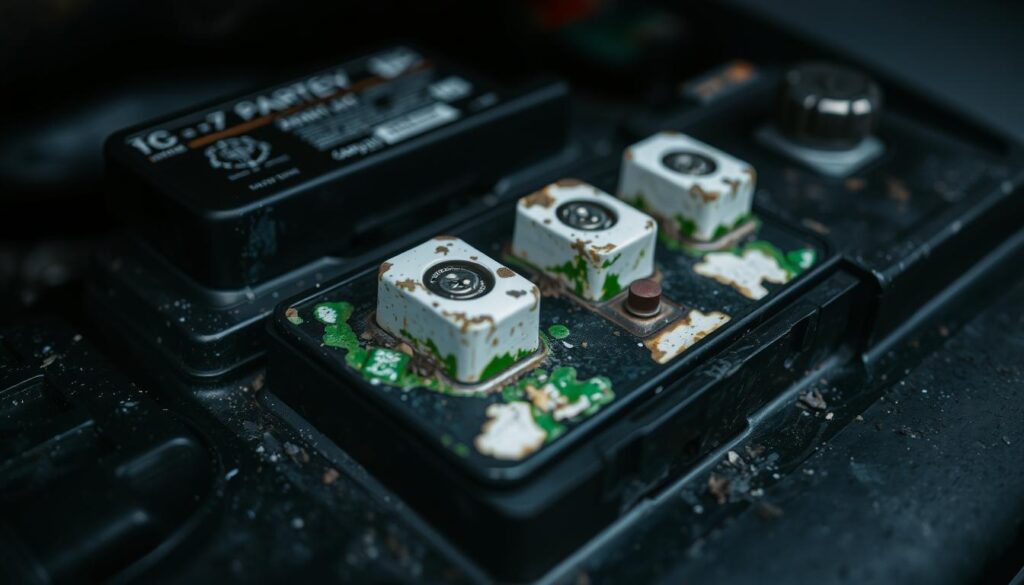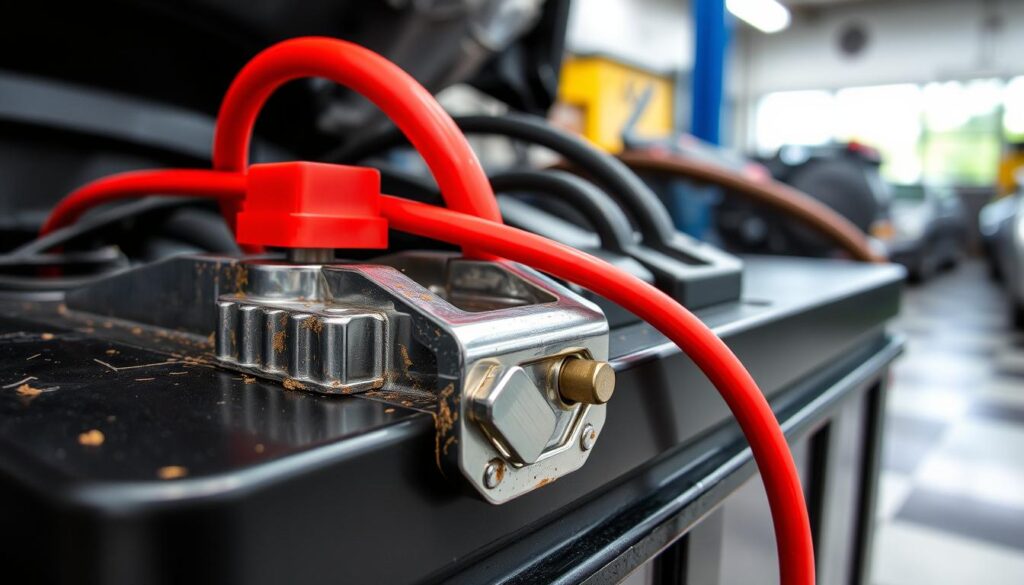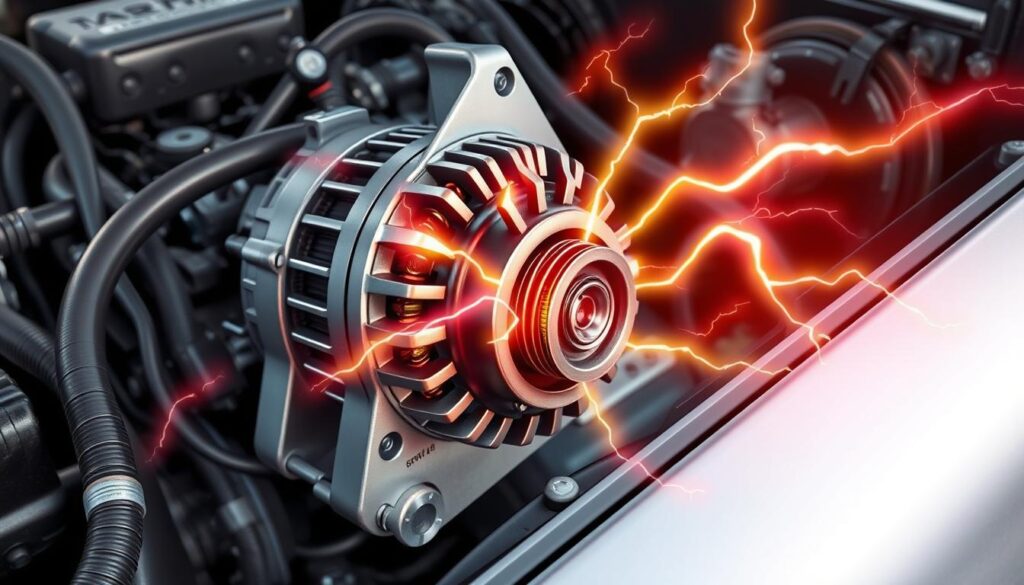Waking up to a dead car battery is frustrating. It leaves you stranded and costs extra money. But, there are simple ways to keep your battery alive longer. I’ll share eight easy tips to help your battery last for years.
Key Takeaways
- Regularly check and clean your battery terminals to prevent corrosion
- Avoid frequent short trips that don’t fully recharge the battery
- Disconnect unused accessories when the car is not in use
- Keep your battery protected from extreme temperatures
- Schedule regular battery checkups with a qualified mechanic
Your car battery is crucial for your vehicle. With a bit of care, it can keep your car running for years. Let’s explore these eight simple tips to make your battery last longer.
Understand Your Car Battery and Its Lifespan
Knowing the basics of your car’s battery is key to keeping it running long. Car batteries vary in types, each with its own lifespan. The common lead-acid battery lasts 3 to 5 years. But, newer lithium-ion batteries can last up to 8-10 years.
The average lifespan of a car battery is 3 to 5 years. But, it can change based on climate, driving, and care. For example, AGM batteries can last up to 7 years with the right care.
Factors Affecting Battery Life
Many factors can shorten your car battery’s life. Extreme temperatures harm battery performance and lifespan. Short trips also reduce battery life since the battery doesn’t fully recharge.
Excessive vibration, corrosion, and loose connections can also cause early failure. By knowing these factors, car owners can extend their battery’s life and avoid breakdowns.
Regularly Check Your Battery’s Charge
Keeping your car’s battery in good shape is key for smooth driving. Regular checks on your battery’s charge can spot issues early. This helps extend its life and keeps your car running smoothly.
Signs of a Weak Battery
Spotting a weak battery is the first step to fixing it. Look out for these signs:
- Slow engine cranking when starting the car
- Dimming of the headlights or dashboard lights
- Electrical issues, such as malfunctioning accessories or interior lights
If you see these signs, it’s time to test and possibly replace your battery.
Tools for Monitoring Battery Health
To watch your battery’s health, use these tools:
- Multimeter – This device checks the battery’s voltage, showing its charge and health.
- Battery tester – This tool gives a detailed look at your battery’s performance and life.
Many auto parts stores offer free battery tests. This makes it simple to keep an eye on your battery. Regular checks prevent unexpected breakdowns and keep your car ready to go.

Keep the Battery Clean and Free of Corrosion
Keeping your car battery clean is key for its long life and good performance. Battery corrosion can block electrical flow, making your battery less efficient and shorter-lived. It’s important to clean and check the terminals regularly for battery maintenance.
Cleaning Methods for Battery Terminals
To avoid corrosion on your battery terminals, mix baking soda and water. Use a wire brush to gently scrub the terminals, then rinse with clean water and dry them well. You can also use a commercial battery cleaner. After cleaning, apply a thin layer of petroleum jelly to prevent future corrosion.
Importance of Regular Inspections
- Regular checks of your car’s battery can spot and fix corrosion before it’s too late.
- Look for white, blue, or green buildup around the terminals, which means corrosion.
- Fixing these issues quickly can help your battery last longer and keep your car’s electrical system working right.
By keeping your car battery clean and free of corrosion, you can make it last longer. Regular terminal cleaning and checks are crucial for battery maintenance and best performance.

Ensure Proper Connections
Keeping your car’s battery connections right is key for its best performance. Regular checks on the cables and terminals can stop many electrical problems. It also keeps your battery safe and working well.
Checking Battery Cables
Look for any damage on the battery cables like fraying, cracks, or rust. Worn-out cables can mess up the electrical flow. This can make your battery less efficient and might cause it to fail early. If you find any serious damage, swap out the cables for better power flow.
Tightening and Securing Connections
- Make sure the battery terminals are clean and free of rust. Use a wire brush or a mix of baking soda and water to clean them.
- Secure the battery cable connections well, but don’t overdo it. The right tightness is between 12-15 Nm (9-11 ft-lbs).
- Keep the battery steady to avoid damage from shaking. This helps it last longer.
By keeping your battery connections clean, tight, and secure, you can make your car’s battery last longer. This also helps avoid sudden electrical problems while driving.

Avoid Short Trips Whenever Possible
Frequent short trips can harm your car’s battery. These trips don’t let the alternator fully charge the battery. This causes sulfation and reduces its capacity over time. To keep your battery healthy, try to make your errands into longer trips. This allows the battery to charge fully.
Impact of Frequent Short Trips
Short trips of 15-20 minutes don’t give the alternator enough time to fully recharge the battery. This can shorten the battery’s life. It makes the battery weaker and more likely to fail.
Tips for Efficient Driving
- Minimize idling: Letting your engine run while stationary can drain the battery, so try to turn off the engine when stopped for more than a minute.
- Avoid rapid acceleration: Gentle acceleration and braking can help reduce the strain on your battery.
- Consider a battery maintainer: If short trips are unavoidable, using a battery maintainer can help keep your battery properly charged.
- Take occasional longer drives: Periodically going on longer trips, such as 30-60 minutes, can help fully recharge your battery and prevent sulfation.

By following these tips, you can improve your driving habits. This helps protect your car’s battery. It ensures your battery lasts longer and works better.
Use Your Car Regularly
Keeping your car’s battery healthy is key for it to work well. One important thing is to drive your car often. If it sits still for too long, the battery can lose its charge and get damaged.
Consequences of Extended Inactivity
When your car is parked for a long time, the battery starts to lose its power. This makes it hard to start the engine. Using things like lights or music systems when the car is off can make it worse.
Not driving your car for a long time can make the battery wear out faster. This means you might have to replace it, which can be expensive.
Recommendations for Infrequent Drivers
- Start your car at least once a week and drive for 15-20 minutes to maintain proper battery charge.
- For long-term storage, consider using a battery maintainer or disconnecting the negative terminal to prevent discharge.
- If you drive your car infrequently, investing in a portable jump starter can be a wise decision for emergency situations when the battery is low.
Driving your car often helps keep the battery in good shape. It makes sure you can start the car when you need to. By driving regularly, you can make your battery last longer and avoid the hassle of a dead battery.

Control Temperature Extremes
Extreme temperatures can harm your car battery’s performance and lifespan. High temperatures cause internal corrosion to speed up. Cold temperatures lower the battery’s capacity. It’s key to protect your battery from these temperature changes.
Effects of High and Low Temperatures
Summer heat is tough on car batteries. It makes the water inside evaporate, causing damage and power loss. Cold weather makes a tired battery more likely to fail. High heat can also make the battery swell and corrode the posts.
Tips for Protection Against Temperature Fluctuations
- Use a battery insulation kit to shield your battery from extreme temperatures.
- Park your car in a shaded area or garage to avoid direct sunlight and heat.
- In cold climates, remove the battery when storing your vehicle and use a battery warmer.
By controlling temperature extremes, you can extend your car battery’s life. Avoiding unexpected breakdowns is possible. Regular maintenance and checking your battery’s health are also important for its performance.
| Temperature Impact | Effect on Battery |
|---|---|
| High Temperatures | Accelerated internal corrosion, water evaporation, and power loss |
| Low Temperatures | Reduced battery capacity and exacerbation of existing wear and tear |
“A well-maintained battery can prevent getting stranded.”
By controlling temperature extremes and protecting your car battery, you can extend its lifespan. This ensures reliable performance, even in challenging weather.
Limit Accessories Usage When Engine is Off
Using accessories like lights, radio, or phone chargers when the engine is off can quickly drain the battery. This battery drain is a big problem, especially if you use these features a lot without letting the alternator recharge the battery.
Common Accessories That Drain the Battery
- Interior and exterior lights
- Audio systems (radio, CD player, etc.)
- Phone and device chargers
- Seat warmers and coolers
- GPS navigation systems
Recommendations for Power Management
To stop accessory usage from draining your car’s battery, follow these tips:
- Turn off all electronics before shutting down the engine.
- Be mindful of built-in features like courtesy lights that may remain on after exiting the vehicle.
- For extended use of accessories, start the engine periodically to allow the alternator to recharge the battery.
- Consider installing a battery monitor to track power management and prevent over-discharge.
By following these simple steps, you can extend the life of your car battery and avoid unexpected battery failure. Remember, proper battery drain management is key to maintaining the health and performance of your vehicle’s power source.
| Accessory | Average Battery Drain (Amps) |
|---|---|
| Interior Lights | 0.5 – 5.0 |
| Audio System | 1.0 – 10.0 |
| Phone Charger | 0.5 – 2.0 |
| Seat Warmers/Coolers | 5.0 – 15.0 |
| GPS Navigation | 0.5 – 2.0 |
The table above shows the battery drain caused by common vehicle accessories. The actual drain may vary based on the specific models and usage patterns.

“Proper power management is crucial for maintaining the health and longevity of your car’s battery.”
Ensure a Proper Charging System
A good alternator is key to keeping your car’s battery healthy. It recharges the battery when the engine is on and powers the car’s electrical systems. If it fails, you might face battery problems and electrical issues.
Importance of a Functional Alternator
The alternator is vital for your car’s charging system. It turns engine energy into electrical energy. This energy recharges the battery and runs the car’s electrical parts. Without a working alternator, your battery will drain fast, making it hard to start your car.
Signs Your Charging System Needs Attention
- Dimming or flickering headlights: This can be a sign that your alternator is not providing enough voltage to the electrical system.
- Battery warning light: If the battery warning light on your dashboard is illuminated, it may indicate an issue with the charging system.
- Difficulty starting the engine: A failing alternator can cause your battery to become increasingly discharged, making it harder to start your car.
Regular checks of your car’s charging system are crucial. A mechanic can test the alternator and other parts. They can find and fix any problems.
| Statistic | Value |
|---|---|
| Average Lifespan of Car Batteries | 3 to 5 years |
| Optimal Battery Operating Temperature | 50°F to 104°F (10°C to 40°C) |
| Recommended Battery Maintenance Frequency | Every 2-4 weeks for lead-acid batteries |

“A faulty alternator can lead to repeated battery failures and should be addressed promptly to prevent further damage.”
Keeping your car’s charging system in check helps your battery last longer. Regular maintenance and quick fixes for alternator problems keep your car running well.
Replace Your Battery When Necessary
Your car’s battery will need to be replaced at some point, even with good care. Knowing when it’s time for a new one can prevent breakdowns. This ensures your car is always ready to go.
Indicators That It’s Time for a Replacement
- Starting your car is hard, especially in cold weather, if your battery is weak.
- A swollen or deformed battery case means it’s time for a new one.
- If your battery is over 3-5 years old, it’s nearing the end and should be watched closely.
Choosing the Right Replacement Battery
When it’s time to replace your car’s battery, pick one that fits your vehicle’s needs. Look at cold cranking amps (CCA) and reserve capacity. This ensures the battery can handle your car’s demands. If unsure, a professional can help with the right fit and connection.
Proper installation is key for your new battery’s long life and performance. If you’re not sure, let a qualified mechanic do it. They’ll make sure it’s done right.
“Regularly inspecting your car battery for signs of dirt or corrosion can reduce the likelihood of unexpected failures.”
Schedule Regular Maintenance
Keeping your vehicle in top shape is key to a long-lasting car battery. Regular checks and inspections by a skilled mechanic can spot problems early. This helps avoid battery failure and other issues.
Benefits of Routine Vehicle Checks
Professional inspections can find signs of battery wear or problems with the charging system. Fixing these issues quickly stops unexpected breakdowns. It also keeps your battery working well.
Finding a Qualified Mechanic
Choose a mechanic with the right certifications and good reviews. They should know your car’s make and model well. A good mechanic can tell you about your car’s condition, including the battery. They’ll suggest the best maintenance or replacement to keep your car running well.
FAQ
What are the different types of car batteries?
Most cars use lead-acid batteries. These batteries go through three stages: formatting, peak, and decline.
How long do car batteries typically last?
Car batteries usually last 3-5 years. But, this can change based on the climate, how you drive, and how well you maintain it.
What factors can affect the life of a car battery?
Extreme temperatures and short trips can harm a battery. So can a lot of vibration and not taking care of it.
How can I tell if my car battery is weak?
A weak battery might start slowly, lights dim, and have electrical problems. Use a multimeter or a battery tester to check its health.
How do I clean and maintain my car battery terminals?
Clean the terminals with baking soda and water or a cleaner. Use a brush to remove corrosion, then rinse and dry. Apply petroleum jelly to prevent corrosion.
How do I ensure proper battery connections?
Check the cables for wear. Make sure connections are tight but not too tight. Secure the battery to prevent vibration.
How can I avoid short trips that can affect my battery’s life?
Try to do all your errands in one trip. If you can’t, use a battery maintainer or take longer drives to keep the battery charged.
What should I do if I don’t drive my car frequently?
Drive your car for 15-20 minutes once a week. For long storage, use a maintainer or disconnect the negative terminal. A portable jump starter can also help.
How can I protect my car battery from extreme temperatures?
Use insulation to protect against temperature changes. Park in the shade or garage. In cold weather, use a warmer or remove the battery for storage.
How can I avoid draining my car battery when the engine is off?
Turn off lights, radio, and chargers before turning off the engine. Be careful of features that stay on. Start the engine if using accessories for a long time.
How do I know when it’s time to replace my car battery?
Look for signs like hard starts, a swollen battery, or if it’s over 3-5 years old. Choose a battery that fits your car’s needs, considering CCA and reserve capacity.
Why is regular vehicle maintenance important for my car battery?
Regular checks by a mechanic can spot issues early. This keeps your car reliable and extends the life of the battery and other parts.
Source Links
- 8 Tips to Extend Your Car Battery Lifespan
- Average Life of Car Batteries: Extend Car Battery Life
- Maximizing Car Battery Life: Tips to Extend Performance and Longevity
- 9 Car Battery Maintenance Tips for Peak Performance
- How to Extend the Life of Your Car Battery
- 8 Simple Tips and Trick To Extend The Life Of Your Car Battery
- 8 Maintenance Tips to Extend the Life of Your Car Battery
- Tips for Prolonging the Life of Your Car Battery
- Extend Your Car’s Battery Life: Car Battery Maintenance Tips & Tricks
- PPT – 8 simple tips and tricks to extend the life of your battery PowerPoint Presentation – ID:9912522
- 17 Tips to extend the life of your car battery
- How to Prolong Your Car Battery Life
- A Maintenance Guide for Your Car Battery
- Top Tips to Preserve Your Car Battery in Winter
- Lengthening life of battery
- How To Protect Your Car Battery From The Heat | Les Schwab
- Tips on Maximizing Equinox EV Battery Life
- National Car Care Month: 12 Easy Battery Maintenance Tips
- 5 Tips to Extend Your Car Battery’s Life
- Tips to Extend Your Vehicle’s Battery Life
- Shockingly Simple Ways to Extend Your car Battery Life
- Battery Maintenance for Equipment: 8 Tips for Maintaining Batteries — ToolSense
- Car Battery Maintenence Tips – 8 Tips To Maintain Car Batteries
- National Car Care Month: 12 Easy Battery Maintenance Tips
- Hyundai Car Battery Life: How to Extend Your | Blog
